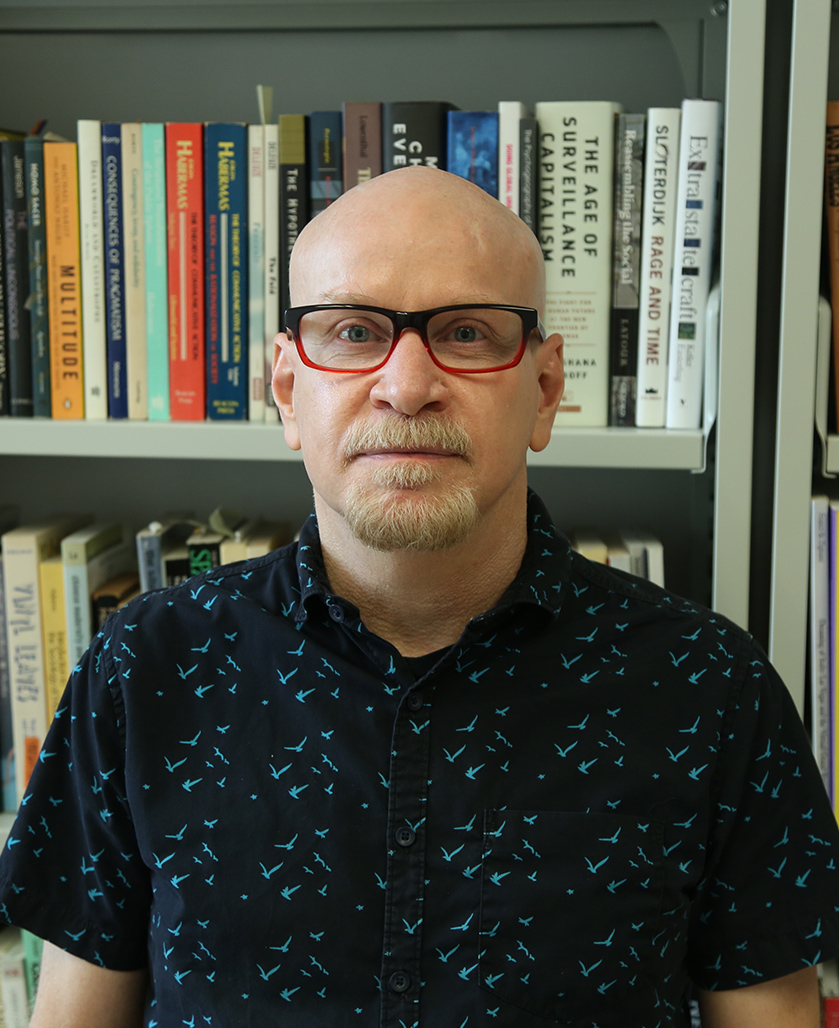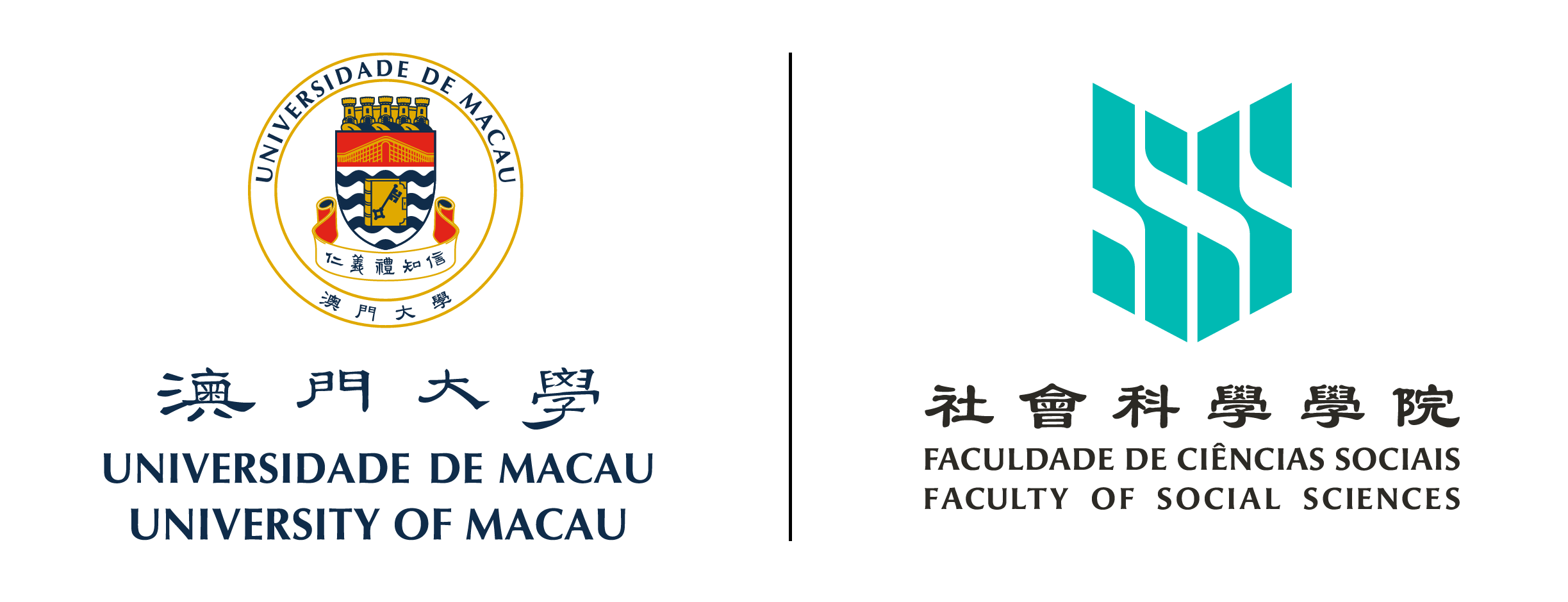
Affiliation
tsimpson@um.edu.mo
Tel
+853 8822 8351
Office
Faculty of Social Sciences (FSS)
University of Macau
Avenida da Universidade, Taipa, Macao
Humanities & Social Sciences Building (E21B), 2044
Consultation Hours
Personal Website
Timothy A. Simpson
Associate Professor
Administrative Roles
Founding Head of Department of Communication (2004-2008)
Academic Qualifications
BA (Auburn University)
MA (University of Arkansas)
Ph.D. (University of South Florida)
Research Interests
My research interests focus on Asian cities; consumer architectures and environments; Chinese tourism and consumption practices; material and immaterial forms of gambling; and ethnographic approaches to everyday life. My forthcoming book with the University of Minnesota Press is tentatively titled: Macau: Baccarat, Biopolitics, and Casino Capitalism.
Teaching Areas
Publications
Books
Tim Simpson (2023). Betting on Macau: Casino Capitalism and China’s Consumer Revolution. University of Minnesota Press.
T. Simpson, Ed. (2017). Tourist Utopias: Offshore Islands, Enclave Spaces, and Mobile Imaginaries. Amsterdam University Press.
Roger Palmer and Tim Simpson (2015). Macao Macau. London: Black Dog Publishing.
Journal Articles and Book Chapters
F. Liang and T. Simpson (2022). Decoding Chinese Millennials: The Culture of Singles in the Post-Mao Era. Southern Communication Journal, 1-14. (ESCI; SCOPUS, Q2 ‘Communication’)
T. Simpson (2021). Macao’s post-Mao grand tour: China’s gamble on urbanization in the Venetian Macao Resort. Journal of Tourism and Cultural Change, 1-21. (SSCI, Q4 ‘Hospitality, Leisure, Sport & Tourism’)
T. Simpson. (2021). Cognac and the comportment of the quality Chinese consumer. Cultural Geographies, 28(2), 393–401. (SSCI, Q2 ‘Geography’)
L. Zhang, S. Y. Kuo, & T. Simpson (2021). Trapped and Resistant Body: Everyday Practices of Women in Taiwan in the Context of Intimate Partner Violence. Journal of Family Violence, 36(6), 657-668. (SSCI, Q2 ‘Family Studies’)
T. Simpson. (2021). “Interiorized urbanism in Macau: Model City for Post-Mao China.” The Emerging Public Realm of the Greater Bay Area: Approaches to Public Space in a Chinese Megaregion, ed. M. Mitrasinovic and T. Jachna. Routledge.
Simpson (2019) “The Velvet Rope and the Chinese Consumer: A Science of the Queue Apparatus.” Applied Mobilities.
Simpson (2019) “LIVE Baccarat Calculations: Macau Machine Gaming and the Production of the Post-Socialist Subject”. Journal of Cultural Economy 12(6): 521-538. (SSCI, Q1 ‘Cultural Studies’)
Simpson (2019) “From Casino Wars to Casino Capitalism: Sovereignty and Gaming in Macau.” UNLV Center for Gaming Research Occasional Paper Series, 46.
T. Simpson (2019) “Macau’s Materialist Milieu: Portuguese Pavement Stones and the Political Economy of the Chinese Urban Imaginary,” Companion to Urban Imaginaries, Ed. Christoph Linder and Miriam Meissner. Routledge.
Simpson (2019) “The Persistence and Significance of Small Urban Spaces in China,” China Review International 24(3): 169-176.
T. Simpson (2018) “Neoliberal exceptions? The liberalization of Macau’s casino gaming monopoly and the genealogy of the post-socialist Chinese subject”. Planning Theory. 17(1): 74-95. (SSCI, Q2 ‘Regional and Urban Planning’)
T. Simpson (2018) “Spectacular Architecture at the Frontiers of Global Capitalism,” Macao and the Casino Complex, Ed. Stefan Al. Reno: University of Nevada Press.
T. Simpson (2018) Comment: “Pavement Pedagogy”, Current Anthropology. 59(4):392-393. (SSCI, Q1 ‘Anthropology’)
T. Simpson (2017) “Mapping Tourist Utopias,” Tourist Utopias: Offshore Islands, Enclave Spaces, and Mobile Imaginaries,” Ed. Tim Simpson. University of Amsterdam Press.
T. Simpson (2017) “After Utopia: Post-Colonial Macau and Post-Socialist Chinese Tourists,” Tourist Utopias: Offshore Islands, Enclave Spaces, and Mobile Imaginaries,” Ed. Tim Simpson. University of Amsterdam Press.
T. Simpson (2016) “Tourist Utopias: Biopolitics and the Genealogy of the Post-World City,”. Current Issues in Tourism 19(1): 27-59. (SSCI, Q1 ‘Hospitality, Leisure, Sport, and Tourism’)
T. Simpson (2016) “Spatial Machines of Subjection: A Materialist Analysis of Macau’s Themed Integrated Casino Resorts”, A Reader in Themed and Immersive Spaces Ed. Scott A. Lukas. Pittsburgh: Carnegie Mellon University – ETC Press. FREE BOOK DOWNLOAD
T. Simpson (2014) “Macau Metropolis and Mental Life: Interior Urbanism and the Chinese Imaginary”,International Journal of Urban and Regional Research. 38(3): 824-832. (SSCI, Q1 ‘Urban Studies’)
T. Simpson (2013) “Scintillant Cities: Glass Architecture, Finance Capital, and the Fictions of Macau’s Enclave Urbanism,” Theory, Culture & Society. 30(7-8): 343-371. (SSCI, Q1 ‘Cultural Studies’) VIDEO ABSTRACT
T. Simpson (2013) “Chinese Tourists, Themed Casinos, and Consumer Pedagogy in Macau,” The Communicative City and Urban Communication in the 21st Century: Urban Communication Reader 3, Ed. S. Drucker, V. Gallagher, M. Matsanakis (Peter Lang).
T. Simpson (2013) “The Ongoing Story of Macau,” International Institute of Asian Studies Newsletter: 21-23.
T. Simpson (2012) “Tourist Utopias: Las Vegas, Dubai, Macau,” Working Paper Series, no. 177, Asia Research Institute , National University of Singapore.
T. Simpson (2011) “Macao Noir: Criminal Brotherhoods, Casino Capitalism, and the Case of the Post-Socialist Chinese Consumer,” Fast Capitalism 8(1). Special issue on “Global Noir,” ed. By Gray Kochharr-Lindgren (With photographs by Adam Lampton).
T. Simpson (2011) “’Neoliberalism with Chinese Characteristics’: Consumer Pedagogy in Macao,” Cities and Fascination: Beyond the Surplus of Meaning, Ed. H. Schmid, W. Sahr, J. Urry (Ashgate).
T. Simpson (2010) “Lazarus, the Dead Mall, and the Demise of the City Center,” Urban Communication Reader II, Ed. H. Jassem, S. Drucker, G. Burd, Hampton Press.
T. Simpson (2009) “Materialist Pedagogy: The Function of Themed Environments in Post-Socialist Consumption in Macau,” Tourist Studies 9(1): 60-80. (SSCI, Q4 ‘Hospitality, Leisure, Sport, and Tourism’)
T. Simpson (2009) “Macau’s Mediterranean Motifs,” World Architecture 12: 104-111.(Published in both English and Chinese; Chinese translation by Xiang Linfei).
T. Simpson, T. Chung, H. Tieben (2009) “A Conversation on Casino Architecture in Las Vegas and Macao.” World Architecture 12: 86-91. (Roundtable discussion also including N. Niglio and B. Lam. Published in both English and Chinese).
T. Simpson (2008) “Macao, Capital of the Twenty-First Century?” Environment and Planning D: Society and Space 26: 1053-1079. (With photographs by Adam Lampton). (SSCI, Q1 ‘Geography’)
T. Simpson (2008), “The Commercialization of Macau’s Cafes.” Ethnography 9(2): 225 – 262. (SSCI, Q3 ‘Anthropology’ and ‘Sociology’)
T. Simpson (2008) “The Proximal Other: Globalization and the Itinerant Subject of Intercultural Communication Research.” International and Intercultural Communication Annual 31. Intercultural Communication in a Transnational World, Ed. L. A. Flores, B. J. Allen, M. P. Orbe, Sage: 1 – 31.
Wu M. and T. Simpson (2007) “Media and Culture,” Mass Communication (Series on Western Research in the Humanities and Social Sciences), Ed. Shuming Lu and Junhao Hong, Beijing: China Remnin University Press: 84 – 132. (Published in Chinese).
T. A. Simpson (2001) “Themed Environments, Suburbs, and the Middle Class in Bangkok,” Etnofoor 14(1), pp. 7-30.
M. Neumann and T. A. Simpson (2001) “Notes from the Underground: Pirate Recording and Popular Music,” Consommations et Societes 1: 39-46.
T. A. Simpson (2000) “Streets, Sidewalks, Stores, and Stories: Narrative and the Uses of Urban Space,”Journal of Contemporary Ethnography 29(6): 682-716. (SSCI, Q3 ‘Sociology’)
T. A. Simpson (1999) “Recycling Urban Spaces,” Western Journal of Communication 63: 310-328. (ESCI; SCOPUS, Q2 ‘Communication’)
M. Neumann and T. A. Simpson (1997) “Smuggled Sound: Bootleg Recording and the Pursuit of Popular Memory,” Symbolic Interaction 20: 319-342. (SSCI, Q2 ‘Sociology’)
T. A. Simpson (1996) “Constructions of Self and Other in the Experience of Rap Music,” Constructing the Self in a Mediated World ed. Debra Grodin and Thomas R. Lindlof, Sage: 107-123.
T. A. Simpson (1995) “Communication, Conflict, and Community in an Urban Industrial Ruin,”Communication Research 22: 700-719. (SSCI, Q1 ‘Communication’)

